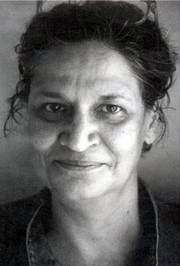Gauri Deshpande
Gauri Deshpande (11 February 1942 – 1 March 2003) was a novelist, short story writer, and poet from Maharashtra, India. She wrote in Marathi and English.
Dr. Gauri Deshpande | |
|---|---|
 | |
| Born | 11 February 1942 Pune, Bombay Presidency, British India |
| Died | 1 March 2003 (aged 60) |
| Nationality | Indian |
| Education | M.A., PhD |
| Occupation | Writer, Poet |
Biography
Deshpande was born in Pune to Irawati and Dinkar Dhondo Karve, youngest of three children. She is also the granddaughter of the social reformer Maharshi Dhondo Keshav Karve.
Her daughter Urmila Deshpande is also an author and published the novels Kashmir Blues[1], A Pack of Lies[2], and Equal to Angels; the short story collection, Slither: Carnal Prose, and edited Madhouse: True stories of the Inmates of Hostel 4.
Education
Deshpande finished her high school education at Ahilyadevi School in Pune. She then attended Fergusson College to receive an M.A in English Literature. She eventually received her PhD in English from Pune University.[1]
Professional life
Deshpande taught at the Department of English at Fergusson College[3] and later as a professor at the department of English at the then University of Pune.
Works
Deshpande wrote in Marathi and English. Her works include fiction, non-fiction, short stories, articles and translations.
Marathi Works
- Paus Ala Motha (1973)[4]
- Ekek Pan Galawaya (1985) (fiction)[5]
- translated to Gujarati as Ekek aa khare pandadun in 1989 by Jayantilal Mehta[6]
- Teruo Te Ani Kahi Door Paryant (1985) (fiction)[7]
- Ahe He Ase Ahe (1986)[8]
- Niragathi Ani Chandrike Ga Sarike Ga (1987)(fiction)[9]
- Dustar Ha Ghat Ani Thang (1989)(Marathi fiction)[10]
- Mukkam (1992)(fiction)[11]
- Vinchurniche Dhade (1996)(fiction)[12]
- Goph (1999)(fiction)[13]
- Utkhanan (2002)(fiction)[14]
- She also translated the ten volumes of "Arabian Nights" written by Sir Richard Burton from English to Marathi. The volumes were published in 1976-77.
English Works
- "Between Births" (1968)[15]
- Lost love (1970)[16]
- The Murder (Article)[17]
- Beyond the Slaughterhouse (1972)(poems)[18]
- The position of women in India (1973)(Pamphlet)[19]
- An anthology of Indo-English poetry (1974)[20]
- Small is beautiful (Article)[21]
- That's the way it is (1982)(Article published in Journal of South Asian literature)[22]
- Collected Plays of Satish Alekar (1989) co-editor. Within the book, the story The Dread Departure was the english translation of the 1974 Marathi play Mahanirvan by Satish Alekar[23][24][25]
- Right on, Sister! (1995)(Article co-authored with Vidyut Aklujkar published in Journal of South Asian literature)[26]
- --and Pine for What Is Not (1995)(translation of Sunita Deshpande's Ahe Manohar Tari...)
- The Lackadaisical Sweeper (1997) (short story collection)[27]
- Diary of a decade of agony (translation of Avinash Dharmadhikari's Aswastha dashakachi diary)
- The female of the Species (a short poem)[28]
Influence
- In 1989, her book Ekek Pan Galawaya was translated to Gujarati as Ekek aa khare pandadun by Jayantilal Mehta[29]
- In 2010, her book Niragathi Ani Chandrike Ga Sarike Ga was translated to English as Deliverance: a Novella by Shashi Deshpande[30][31]
- In 2018, her book Paus Ala Motha was adapted into the Marathi film Aamhi Doghi.[4]
References
- "'I could write only after mother died' | Latest News & Updates at Daily News & Analysis". dna. 25 July 2010. Retrieved 27 February 2018.
- "A Bruising Pursuit Of Love". outlookindia.com. Retrieved 1 March 2018.
- "Fergusson College, Pune". fergusson.edu. Retrieved 28 February 2018.
- "FILM: AAMHI DOGHI - Pune Mirror -". Pune Mirror. Retrieved 27 February 2018.
- Deshpande, Gauri (1985). Ekeka pāna gaḷāvayā. Mumbaī: Mauja.
- Deshpande, Gauri; Mehta, Jayantilal Manilal (1989). Ekek aa khare pandadun (in Gujarati). Bombay: Navbharat.
- Deshpande, Gauri (1985). Teruo ani kahee duraparyant (in Marathi). Bombay: Mauj Prakashan.
- Deshpande, Gauri (1986). Āhe he asã āhe. Mumbaī: Mauja Prakāśana Gr̥ha.
- Deshpande, Gauri (2008). Niragāṭhī āṇi Candrike ga, sārike ga. Mumbaī: Mauja Prakāśana Gr̥ha.
- Deshpande, Gauri; Deshpande, Gauri (1989). "Dustara hā ghāṭa": āṇi, "Thāṅga". Mumbaī: Mauja Prakāśana Gr̥ha.
- Deshpande, Gauri (1992). Mukkāma (in Marathi). Mumbaī: Mauja Prakāśana Gr̥ha.
- Deshpande, Gauri (1996). Viñcurṇīce dhaḍe. Mumbaī: Mauja Prakāśana Gr̥ha.
- Deshpande, Gauri (1999). Gopha. Mumbaī: Mauja Prakāśana Gr̥ha. ISBN 8174861106.
- Deshpande, Gauri (2002). Utkhanana. Mumbaī: Mauja Prakāśana Gr̥ha. ISBN 8174862838.
- Deshpande, Gauri (1968). Between births. Calcutta: Writers Workshop.
- Deshpande, Gauri (1970). Lost love. Calcutta: Writers Workshop.
- Deshpande, Gauri (1972). "THE MURDER". mahfil Mahfil. 8 (4): 71–72. ISSN 0025-0503.
- Deshpande, Gauri (1972). Beyond the slaughter house poems. Calcutta: Pritish Nandy on behalf of Dialogue Publications.
- Deshpande, Gauri (1973). The position of women in India. Bombay.
- Deshpande, Gauri (1974). An anthology of Indo-English poetry. Delhi: Hind Pocket Books.
- Deshpande, Gauri (1980). "SMALL IS BEAUTIFUL". indilite Indian Literature. 23 (1–2): 183–185. ISSN 0019-5804.
- Deshpande, Gauri; Engblom, Philip; Bhagwat, Vidyut; Junghare, Indira (1982). "THAT'S THE WAY IT IS". jsasianlit Journal of South Asian Literature. 17 (1): 75–78. ISSN 0091-5637.
- "Getting it Rite". mid-day. 12 December 2014. Retrieved 27 February 2018.
- Collected Plays of Satish Alekar: The Dread Departure, Deluge, The Terrorist, Dynasts, Begum Barve, Mickey and the Memsahib. Oxford, New York: Oxford University Press. 1 March 2011. ISBN 9780198069881.
- Āḷekara, Satīśa; Deshpande, Gauri (1989). The dread departure = Mahanirvan. Calcutta: Seagull Books. ISBN 817046059X.
- Deshpande, Gauri; Aklujkar, Vidyut (1995). "RIGHT ON, SISTER!". jsasianlit Journal of South Asian Literature. 30 (1–2): 17–22. ISSN 0091-5637.
- Deshpande, Gauri (1997). The lackadaisical sweeper: short stories. Chennai: Manas. ISBN 8186852042.
- Roy, Devapriya. "On Mother's Day, a warm, moving book that happens to be about mothers and daughters". Scroll.in. Retrieved 27 February 2018.
- Deshpande, Gauri; Mehta, Jayantilal Manilal (1989). Ekek aa khare pandadun (in Gujarati). Bombay: Navbharat.
- Deshpande, Gauri; Deshpande, Shashi; Deshpande, Shashi; Deshpande, Shashi (2010). Deliverance: a novella. New Delhi: Women Unlimited. ISBN 8188965634.
- Kulkarni, Reshma (5 March 2011). "All in the family". The Hindu. ISSN 0971-751X. Retrieved 28 February 2018.